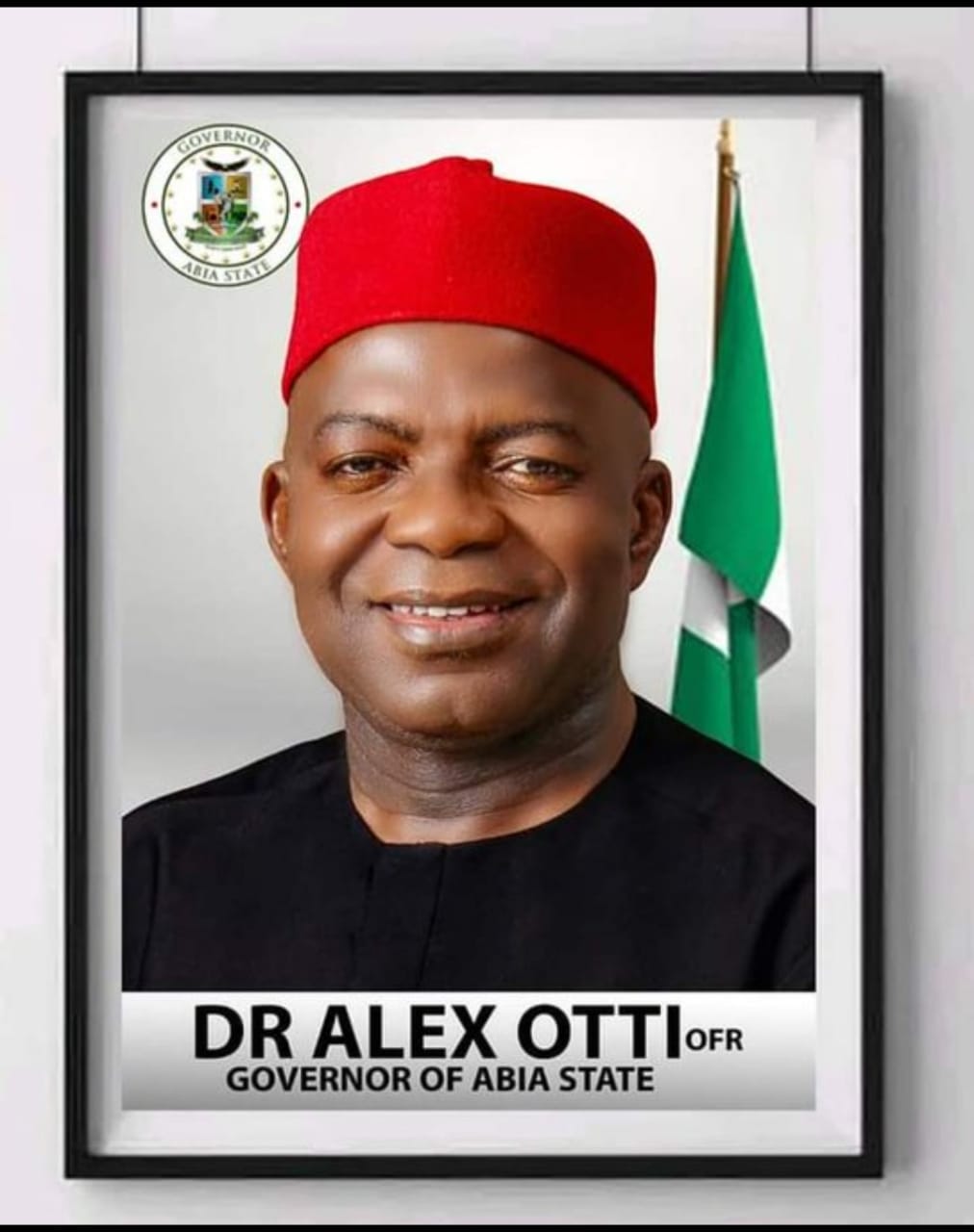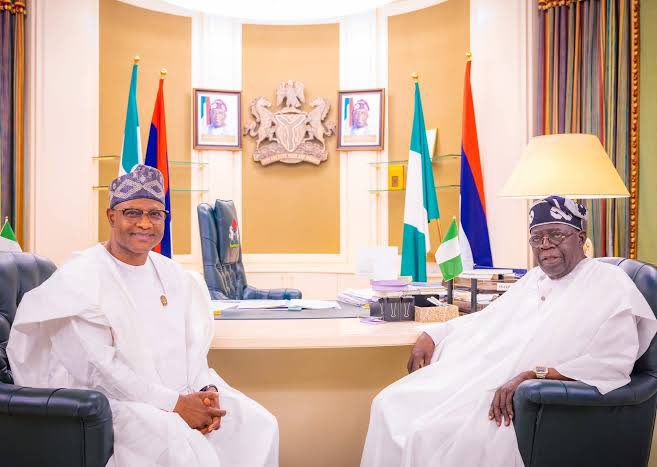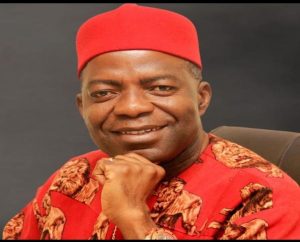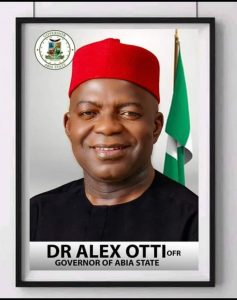Politics
Alex Otti In Trouble As APC Vows To Take Over Abia In 2027

Alex Otti In Trouble As APC Vows To Take Over Abia In 2027
By George Omagbemi Sylvester
The political atmosphere in Abia State is heating up, and the temperature is rising rapidly. The All Progressives Congress (APC) has fired a direct political missile at Governor Alex Otti, vowing with unshakable resolve to take over the Government House in Umuahia come 2027. It is no longer business as usual. The sleeping giant of the opposition in the state claims to be wide awake, and the battle for the soul of Abia has begun in earnest.
The APC chieftains, speaking in Umuahia last week, declared unequivocally that they are on a mission to “rescue Abia from economic stagnation and elitist governance.” Their choice of words was deliberate and direct—a sharp criticism of Otti’s leadership style, which many within and outside the state describe as more cosmetic than transformational.
A Wake-Up Call for Labour Party
Alex Otti, a former bank executive and celebrated technocrat, rode to power under the Labour Party’s banner in 2023, buoyed by the Peter Obi wave and a strong anti-establishment sentiment among the electorate. His emergence was seen as a break from decades of political recycling in Abia. But less than two years into his tenure, the narrative has begun to shift.
Critics argue that Otti has failed to address the core structural and socio-economic issues affecting the state. While flyovers, road rehabilitation, and civil service audits dominate his press briefings, many say these are mere surface-level interventions. The youth remain unemployed, the SMEs suffocating under harsh taxes, and rural areas neglected.
The APC’s bold declaration should not be taken lightly. The party, which has federal might and a national structure, is poised to exploit every misstep of the current administration. According to Chief Ikechi Emenike, a prominent APC stakeholder in Abia, “We are going to dismantle this Labour Party experiment in 2027. What is going on in Abia today is not governance—it is a reality show.”
History and the Winds of Political Change
Abia’s political history has largely been dominated by the PDP until the Labour Party disrupted the power structure in 2023. However, the euphoria of change is being quickly eroded by a growing sense of disillusionment. Political observers note that Otti’s technocratic governance style often clashes with the everyday realities of the average Abian.
The APC is capitalizing on this disconnect. They are rebranding and reorganizing. Several prominent politicians from both PDP and LP have reportedly begun secret talks with the APC ahead of 2027. As the legendary political thinker Niccolò Machiavelli wrote in The Prince, “It is better to be feared than loved, if you cannot be both.” The APC seems to be adopting this posture—less of diplomacy, more of political conquest.
Governance Under Scrutiny
The Labour Party-led administration in Abia cannot afford to ignore the mounting criticisms. While Governor Otti has been praised for promoting transparency and tackling ghost workers, many still argue that the state’s economy is shrinking. According to data from the National Bureau of Statistics (NBS), Abia ranked 24th out of 36 states in Internally Generated Revenue (IGR) in 2024—a sharp contrast to the governor’s media claims of economic transformation.
In the words of Nobel Laureate Joseph Stiglitz, “Development is not about highways and flyovers; it is about improving the lives of the people.” If the APC succeeds in framing the current administration as elitist and disconnected, they may very well succeed in 2027.
The Power of Political Messaging
The APC’s strategy is clear: target the grassroots. With over 70% of Abians living in rural communities, a political party that ignores them does so at its peril. According to Professor Chidi Odinkalu, a respected human rights activist, “Democracy must begin at the village square.” Unfortunately, many in Abia’s hinterlands claim they haven’t seen any difference since Otti assumed office.
Former President Barack Obama once said, “You can put lipstick on a pig, but it’s still a pig.” The APC seems to be deploying this line of attack: no matter how beautified Umuahia looks, if the people in Arochukwu, Bende, and Umunneochi still drink muddy water and send their children to roofless schools, the government has failed.
A Divided Opposition, or a Formidable Force?
The only potential setback for the APC is internal disunity. The party has suffered from factionalism in the past. But recent moves suggest a consensus is building around the goal of reclaiming Abia. If the party can field a charismatic candidate with both grassroots and elite appeal, Governor Otti may be in serious trouble.
Dr. Ngozi Okonjo-Iweala, Director-General of the World Trade Organization, once stated, “Leadership is not about titles or positions. It is about impact, influence, and inspiration.” This is a powerful reminder that political branding alone cannot win elections. Performance must meet perception.
The People Hold the Key
No political calculation is complete without considering the voters. The people of Abia will ultimately decide who governs them. The 2023 elections demonstrated that they are tired of recycled politics. But what they want now is not just change—but results.
Dr. John Campbell, former U.S. Ambassador to Nigeria, wrote in his book Nigeria: Dancing on the Brink, “Nigerians are not asking for miracles. They are asking for basic decency in governance.” The people of Abia want working hospitals, functioning schools, a vibrant economy, and jobs—not press releases or photo-ops.
Looking Ahead: 2027 and Beyond
With less than two years to the next election, political movements will intensify. The APC’s message of reclaiming Abia must be matched with credible plans, not just political rhetoric. They must offer an alternative that resonates with ordinary people. For now, Governor Otti still holds the mandate, but his political honeymoon is clearly over.
Former U.S. President Dwight D. Eisenhower once warned, “Leadership is the art of getting someone else to do something you want done because he wants to do it.” Governor Otti must reconnect with the aspirations of the masses or risk being dethroned by a more tactically grounded opposition.
As 2027 approaches, the state will likely witness a fierce electoral battle—one not just of personalities, but of ideologies, performance, and public trust. If the APC maintains its current momentum and strategic clarity, then indeed, Alex Otti may be in serious political trouble.
Conclusion
The vow by the APC to take over Abia in 2027 is more than political talk; it is a signal of war. A war of narratives, of performance, and of perception. Governor Alex Otti must rise above press conferences and elite commendations. He must return to the streets, listen to the people, and correct the course of his administration. The time of political grace is gone. Now begins the time of political reckoning.
As the popular African proverb goes, “The man who fetches firewood infested with ants invites lizards to his home.” If Governor Otti does not change direction quickly, the lizards of opposition may soon overrun his political household.
news
Journalists for Good Governance Shines Searchlight on Local Government Administration

Journalists for Good Governance Shines Searchlight on Local Government Administration
…Calls for Accountability in Nigeria’s Grassroots Governance
LAGOS, Nigeria — A civil society coalition known as Journalists for Good Governance(JGG) has intensified public debate on transparency and accountability within Nigeria’s local government system, urging media professionals, civil society actors, and citizens to hold grassroots leaders accountable.
Speaking an event in Lagos recently, the acting chairman of the society, Comrade Bunmi Obarotimi said that despite reforms such as the Supreme Court’s 2024 ruling granting financial autonomy to all 774 Local Government Areas (LGAs), systemic challenges continues to hinder effective service delivery and responsible stewardship of public funds.
“Local governments are the closest tier of government to the people — yet too often they remain the least transparent. Without civic oversight and vibrant media, promises of autonomy ring hollow.” the acting chairman said.
The Journalist for Good Governance emphasised crucial roles that journalists can play in uncovering discrepancies in council spending, flagging poor service delivery, and educating citizens on their rights. Their call comes amid wider efforts by media and civic organisations to bridge accountability gaps. The civil society initiatives had previously launched monitoring campaigns to track local government expenditures and have been quietly advocating for transparency in how public money is deployed.
The leaders of the Journalists for Good Governance (JGG) highlighted the importance of physical assessment and citizens engagement on projects to boost people’s confidence, urging local councils to adopt open data platforms and proactive information dissemination in compliance with the Freedom of Information Act. Experts say the majority of LGAs currently lack operational websites or digital portals, further limiting public scrutiny.
The Journalists for Good Governance initiative aligns with sustained advocacy by civil society groups and governance experts calling for a collective approach to strengthening democratic accountability, and has decided to engage in critical and holistic assessments of how Local Governments is being run and the impact and quality of projects they embark-on and to address deficits in transparency and public trust.
Meanwhile, some state governments have signalled support for improved community engagement. In Lagos State, authorities reiterated a commitment to enhancing community media platforms as vehicles for civic participation and accountability at the grassroots level.
The renewed spotlight on local government administration has reignited public debate over fiscal responsibility and priorities. Controversies such as the widely criticised Adamawa council chairmen’s wives trip to Istanbul — which drew public outrage for perceived misuse of public funds — underscore why watchdog groups say stronger oversight mechanisms are urgently needed at the grassroots.
Citizens and activists have welcomed the journalists’ initiative, calling for sustained media engagement that goes beyond headlines to influence policy and accountability reform.
The civic rights advocates note that real change will require robust legal frameworks, a free press, and empowered communities equipped to demand transparency at every level of governance.
As Journalists for Good Governance mobilises its members, the coming months are likely to see heightened media attention on grassroots administration — from council budgets and service delivery to the enforcement of public information laws and digital transparency initiatives.
Politics
Gov. Dauda Lawal commissions projects in Anka LGA, Commits to Sustainable Development

Gov. Dauda Lawal commissions projects in Anka LGA, Commits to Sustainable Development
The Executive Governor of Zamfara State, Dr. Dauda Lawal, has reiterated his administration’s steadfast commitment to guiding Zamfara State towards sustainable development by inaugurating and initiating a series of pivotal projects in the Anka Local Government Area.
Among the key undertakings announced are the comprehensive reconstruction and modernization of the Emir of Anka’s palace, signaling a revitalization of traditional leadership; the initiation of work on the crucial Anka–Abbare Road, which is expected to significantly improve connectivity; and the construction of a new Local Government Secretariat.
Additionally, the projects encompass the establishment of dedicated offices for the Hisbah Commission and the Community Protection Guards, alongside the reconstruction of the Safe School in Anka, emphasizing the administration’s focus on enhancing educational infrastructure.
During the commissioning event, Governor Lawal highlighted that these projects are a fulfillment of commitments made during his campaign, aimed at transforming the local landscape by improving infrastructure, stimulating economic growth, bolstering public service efficiency, and enhancing the capacities of security agencies. He called for a collective effort from the community to ensure proper maintenance of these facilities, underscoring the shared responsibility in preserving public assets.
Governor Lawal shared that similar projects have also been inaugurated in Tsafe, with plans for upcoming projects in Kaura Namoda, Moriki, Bungudu, Bukkuyum, and Zurmi, all expected to be completed and inaugurated by the year’s end. This ambitious timeline reflects the administration’s urgency in addressing the development needs of various regions within the state.
In his remarks, the governor urged residents and local traditional institutions to collaborate closely in maintaining the newly commissioned structures and supporting the overarching objectives of his administration. “I stand here in Anka today to honor our commitments to the people of Anka Local Government and all of Zamfara State. The official opening of the new palace for the ‘Sarkin Zamfaran Anka’ and the Zamfara State Council of Chiefs is a significant milestone that wraps up today’s agenda,” he stated.
Governor Lawal emphasized the strategic importance of the Anka–Abbare Road, describing it as a critical artery that will not only enhance access to remote areas but also stimulate economic activities and generate multiplier effects throughout the local economy. He articulated the necessity of providing a conducive work environment for civil servants, affirming that the new local government secretariat and dedicated offices will significantly contribute to strengthening law and order within the state.
“Education is the cornerstone of any thriving society. Our focused initiatives are oriented towards fostering a safe, secure, and supportive environment for our students. I am also proud to announce the completion and commissioning of the reconstructed SAFE School Anka today,” he remarked, reaffirming the administration’s dedication to education.
The governor further noted that the commissioning of the Emir’s Palace serves to restore the historical prominence of traditional institutions, which he regards as pivotal custodians of the region’s culture and heritage. He underlined the administration’s awareness of the invaluable role that these institutions play in fostering the state’s growth and emphasized the necessity of aligning development projects with cultural values.
In conclusion, the governor mentioned that after the successful commissioning in Anka and Tsafe, future projects in Kaura Namoda and Moriki will follow suit, while those in Bungudu, Bukkuyum, and Zurmi remain on track for completion and official commissioning before the year concludes.
news
GEN CHRISTOPHER GWABIN MUSA SUPPORT INITIATIVE HAILS GOVERNOR UBA SANI’S APPOINTMENT AS RENEWED HOPE AMBASSADOR

GEN CHRISTOPHER GWABIN MUSA SUPPORT INITIATIVE HAILS GOVERNOR UBA SANI’S APPOINTMENT AS RENEWED HOPE AMBASSADOR
The Gen Christopher Gwabin Musa Support Initiative (GCGMSI) has extended its warm congratulations to His Excellency, Mallam Uba Sani, the Executive Governor of Kaduna State, following his recent appointment as a Renewed Hope Ambassador and Deputy Director-General for Party Outreach, Engagement, and Mobilisation by the All Progressives Congress (APC).
This felicitation was formally conveyed in a statement signed by the Initiative’s Convener, Ibrahim Dahiru Danfulani, Sadaukin Garkuwan Keffi/Betara Biu, and disseminated to the press.
The statement highlighted that the Grand Patron of the GCGMSI, His Excellency General Christopher Gwabin Musa, OFR, Minister of Defence of the Federal Republic of Nigeria, received the news of the appointment with great pride but without surprise. According to the statement, General Musa expressed unwavering confidence in Governor Uba Sani’s proven capability and salient leadership qualities, affirming that the Governor is eminently equipped to deliver on every task entrusted to him.
The Grand Patron further extended profound appreciation to the President and Commander-in-Chief of the Armed Forces, His Excellency Asiwaju Bola Ahmed Tinubu, GCFR, for recognising and finding Governor Uba Sani worthy of this critical national assignment. The appointment, which takes effect immediately, was made by the President in his capacity as the leader of the APC, citing the Governor’s exceptional organisational abilities and strategic acumen.
In his new role, Governor Sani is tasked with working in close collaboration with the Director-General of the Renewed Hope Ambassadors and the party hierarchy, including the National Chairman of the APC. His primary mandate is to ensure harmony, inclusiveness, and strategic coordination across all levels of the party’s mobilization and engagement architecture, a vital function for advancing the political agenda.
Demonstrating its commitment to national service and effective governance, the GCGMSI, under the direct directive of its Grand Patron, General Musa, has officially mobilised its formidable structure. The Initiative has pledged the full deployment of its extensive network, seasoned personnel, and robust operational framework to assist and support Governor Uba Sani in the successful execution of his new responsibilities.
The Gen Christopher Gwabin Musa Support Initiative, renowned for its disciplined organisation, widespread grassroots penetration, and capacity for large-scale civic mobilisation, stands ready as a pivotal force. This move underscores the GCGMSI’s pivotal role as a key support system for national development initiatives and its unwavering dedication to fostering unity and progress under the Renewed Hope agenda.
-

 celebrity radar - gossips6 months ago
celebrity radar - gossips6 months agoWhy Babangida’s Hilltop Home Became Nigeria’s Political “Mecca”
-

 society6 months ago
society6 months agoPower is a Loan, Not a Possession: The Sacred Duty of Planting People
-

 society5 months ago
society5 months agoReligion: Africa’s Oldest Weapon of Enslavement and the Forgotten Truth
-

 news6 months ago
news6 months agoTHE APPOINTMENT OF WASIU AYINDE BY THE FEDERAL GOVERNMENT AS AN AMBASSADOR SOUNDS EMBARRASSING










